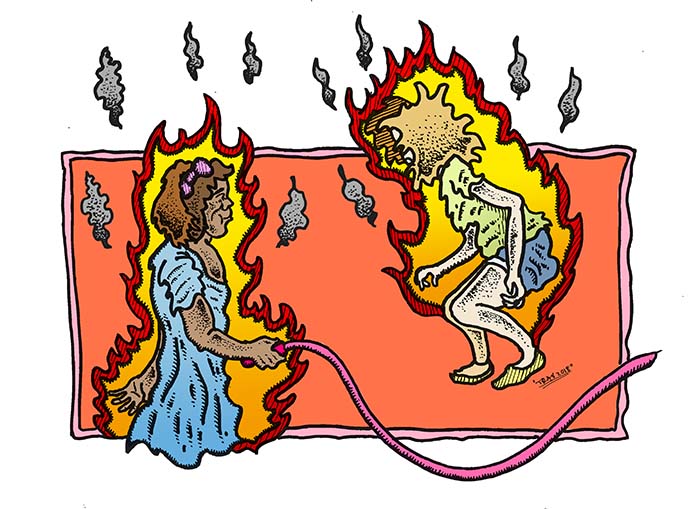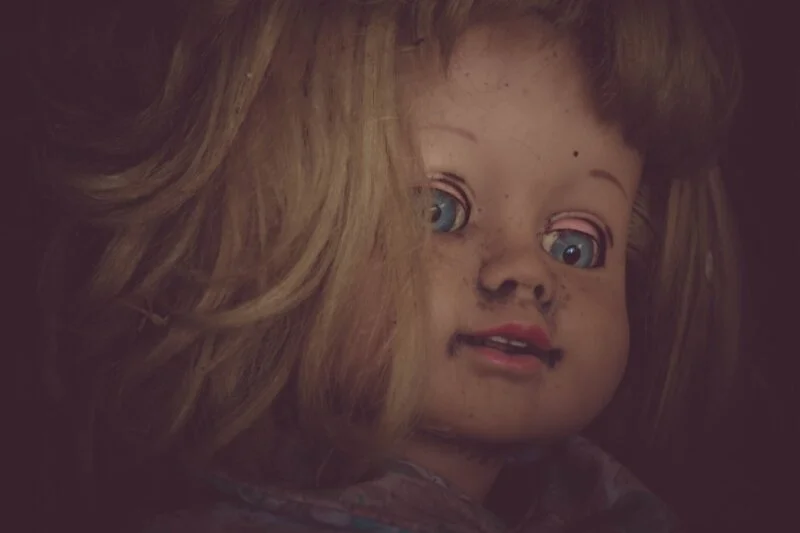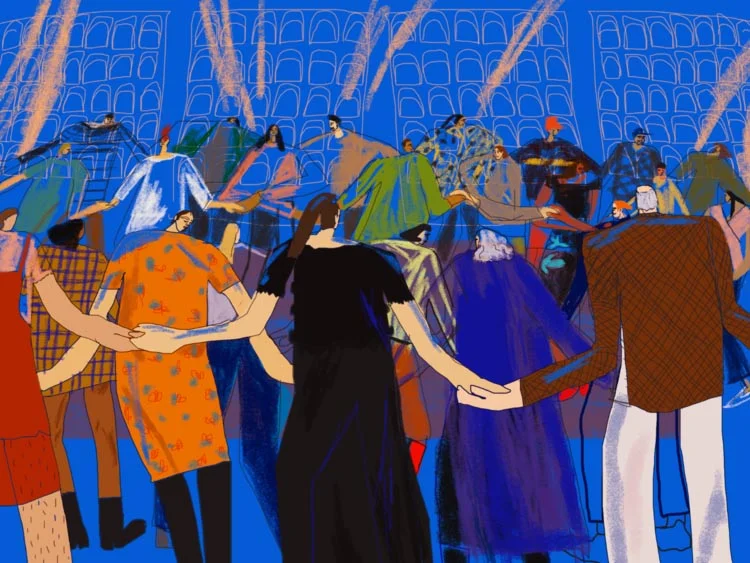The Creepy Histories Behind Victorian Jump Rope Rhymes
Who knew those cute, little songs were so macabre?
By Marybeth Connaughton
Little girls often concocted the rhymes using bits and pieces of conversation they’d overheard from adults. (Art: Trav)
In some ways, jump rope rhymes were the original memes. Long before a news item could go viral around the world in a matter of hours, jump rope rhymes — also called skipping chants — were a means of disseminating stories about current events, gossip, advertising slogans, and political propaganda.
Created mostly by young girls in the U.K., U.S., and Ireland, these Victorian era rhymes made their way across the countries, from sidewalk to sidewalk and schoolyard to schoolyard, with only slight variations along the way.
Like nursery rhymes, jump rope rhymes use accentual verse, which has a fixed number of stresses per line, to keep all players united under one rhythm. Many girls used their mothers' clothing lines as the jump ropes, and concocted the rhymes by repurposing the language that swirled around them in their everyday lives, some of which may have gone over their heads.
Below is a list of the more surprising, and at times disturbing, cultural references hidden in some of the most recognizable jump rope rhymes of the 20th century.
“Influenza”
I had a bird. Her name was Enza.
I opened the window and
In-flew-Enza!
This cute little pun may seem harmless now, but it pivots on the name of a virus that, during the 1918 Flu Pandemic, infected a third of the world's population in a matter of months and killed approximately 50 million people. Victims died within hours of contracting influenza, often developing a secondary pneumonia that left them unable to draw breath. Their skin often turned a blue/black color as the result of a condition called cyanosis, which occurs when there is a lack of oxygen in skin tissues.
Strict measures were taken to keep the disease from spreading. To enter certain towns or to board certain trains, one would need a written certificate from a doctor proving they were healthy. The mayor of New York City urged employers to stagger work shifts, hoping to keep subway cars from hosting too many commuters at any one time. Department stores were barred from having sales to avoid large groups of people in one area, and funerals were capped at 15 minutes to prevent people from lingering too long around the bodies.
This chant circulated while the pandemic was at its height, and it’s likely many girls incorrectly thought they were singing about a bird named Enza, instead of a deadly virus that was killing off their loved ones.
“The Wife of Michael Cleary”
Are you a witch or are you a fairy,
Or are you the wife of Michael Cleary?
In 1895, in their home in Ballyvadlea, Ireland, Michael Cleary set his wife Bridget on fire and watched as she burned to death. He believed that fairies had kidnapped Bridget and replaced her with a changeling, and that fire would force the changeling out and return his wife to him. This was in accordance with an old Irish belief that fairies, who lived in raths — old abandoned circular dwellings like the one very near the Cleary's house — would kidnap people and hold them hostage if they wandered too close to their homes.
Bridget had been acting strangely in the week leading up to her death, likely due to a respiratory illness she contracted while out walking. Her refusal to drink potentially lethal "curative" tinctures and inability to answer questions if they were asked three times, fueled Michael's suspicion that she was a changeling.
The trial of Michael Cleary caused a great stir in Ireland and Britain, leading some to question the efficacy of Irish home rule. As the last embers of the 19th century died away, so did faith in superstition, folklore, and home remedies. Bridget, a successful seamstress and breadwinner for the Cleary household, would have belonged better in 20th century Ireland, which embraced modern medicine and organized religion. Instead, she became famous for being the last witch burned in Ireland.
“Miss Lulu Had a Baby…”
Miss Lulu had a baby
She named him Tiny Tim.
She put him in the bathtub
to see if he could swim.
He drank up all the water.
He ate up all the soap.
He tried to swallow the bathtub
but it wouldn't go down his throat!
Mommy called the doctor.
The doctor called the nurse.
The nurse called the lady with the alligator purse!
"Measles!' said the doctor.
"Mumps!" said the nurse.
"Vote!" said the lady with the alligator purse.
“Miss Lulu” is one of the most popular and well-known jump rope rhymes of the 20th century, and the advice to vote from the lady with the alligator purse is believed to be a nod to renowned suffragette Susan B. Anthony.
Throughout her life spent touring the country in promotion of women's suffrage and the abolition of slavery, Anthony is said to have carried around a purse made of alligator skin, which she wielded more like a briefcase, to carry her pamphlets and copies of her speeches. It served a dual purpose in that it became a symbol of women's financial independence, something Anthony was a staunch advocate for.
In the 19th century, women, once married, were not allowed to open a bank account or rent property, and any money earned from the few occupations available to women immediately became property of their husbands. Anthony believed that there was "no true freedom for woman without the possession of all her property rights." To truly be independent, a woman needed a purse of her own, alligator skin or otherwise.
“The Glimmer Man”
Keep it boiling on the glimmer.
If you don't, you get no dinner.
Ireland declared neutrality throughout the Second World War, putting itself in an official state of emergency in 1939. Due to this political decision, Ireland was subject to serious trade restrictions from the rest of Europe, including the importation of coal, which Ireland relied heavily on, having very little of its own.
Gas companies sent inspectors — known as “glimmer men” — to homes throughout the country to quantify how much coal people were using. They got their unofficial moniker from advertisements urging citizens to use no more than the bare glimmer of gas for cooking or heating up and lighting their homes.
If glimmer men found that a residence was using more than its allotted amount, they were instructed to cut the house off from the main supply. In Ireland, this term is still used to refer to someone who intrudes, especially in bureaucratic matters.
“Lizzie Borden”
Lizzie Borden took an axe,
and gave her mother 40 whacks.
When she saw what she had done,
she gave her father 41.
In reality, Abby Borden was struck 18 times with an axe, while her husband Andrew was struck ten or 11 times. But the truth never stood in the way of a good rhyme. Though she was never actually convicted of the murder, many believe that Lizzie Borden, who was Andrew's oldest daughter and Abby's step daughter, murdered the couple in their Fall River, Mass., home on the fateful morning on August 4, 1892.
There were several motivations attributed to the murder. Lizzie and her younger sister Emma were said to have suffered various forms of abuse, from their father in particular. The sisters had a cold relationship with Abby and were upset that their father was gifting several of her family members with real estate while his two daughters didn't stand to inherit much at all. There has even been some speculation that Abby caught Lizzie in a lesbian tryst with the maid and that Lizzie killed Abby to keep the secret hidden, as it would have been a major scandal back in the day.
To make matters even more confusing, Lizzie's story kept changing, and she was found tearing up one of her dresses with the intention of burning it, claiming it had been stained with paint. A broken hatchet believed to be the murder weapon was also found in the basement with dust laid on it to make it appear as though it had sat unused for some time.
Ultimately, LIzzie was acquitted and no one was ever charged with the crime. She remained in Fall River until her death, enduring taunts from the local children who created the rhyme.
“red-rag and pink-flag”
red-rag and pink-flag
black shirt and brown
strut-mince and stink-brag
have all come to town
some like it shot
and some like it hung
and some like it in the twot
nine months young
While poet ee cummings was living in Paris, World War II had begun and its most unspeakable acts were being committed closer and closer to his doorstep. Cummings was critical of all the regimes involved and all of the acts of violence and destruction being carried out by each. On Bastille Day of 1940, the streets were filled with tanks and riot police in anticipation of a Communist demonstration on behalf of the Spanish Republic. Cummings wrote this bitter parody of the popular skipping rhyme, “Peas Porridge Hot” to commemorate that moment:
Peas porridge hot.
Peas porridge cold.
Peas porridge in the pot
Nine days old.
A "red rag" was slang for any Communist newspaper. "Brown shirts" were the Sturmabteilung, the paramilitary branch of Hitler's Nazi Party. "Black shirts" were soldiers in Mussolini's National Fascist Party. During the Spanish Civil War, those who were discovered to be Republicans in opposition to Franco's nationalist party were executed, often by means of shooting or hanging. The final two lines refer to rape being used as a weapon of war. Cheery stuff.









Creative uses for ashes abound as people increasingly seek personalized memorials for their loved ones.